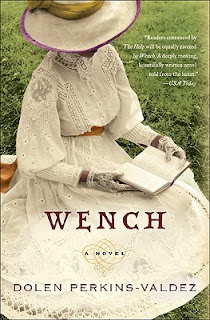Wench - Dolen Perkins Valdez
Summary:
Tawawa
House in many respects is like any other American resort before the Civil War.
Situated in Ohio, this idyllic retreat is particularly nice in the summer when
the Southern humidity is too much to bear. The main building, with its
luxurious finishes, is loftier than the white cottages that flank it, but then
again, the smaller structures are better positioned to catch any breeze that
may come off the pond. And they provide more privacy, which best suits the
needs of the Southern white men who vacation there every summer with their
black, enslaved mistresses. It's their open secret.
Lizzie, Reenie, and Sweet are regulars at Tawawa House. They have become friends over the years as they reunite and share developments in their own lives and on their respective plantations. They don't bother too much with questions of freedom, though the resort is situated in free territory–but when truth-telling Mawu comes to the resort and starts talking of running away, things change.
To run is to leave behind everything these women value most–friends and families still down South–and for some it also means escaping from the emotional and psychological bonds that bind them to their masters. When a fire on the resort sets off a string of tragedies, the women of Tawawa House soon learn that triumph and dehumanization are inseparable and that love exists even in the most inhuman, brutal of circumstances–all while they are bearing witness to the end of an era.
Lizzie, Reenie, and Sweet are regulars at Tawawa House. They have become friends over the years as they reunite and share developments in their own lives and on their respective plantations. They don't bother too much with questions of freedom, though the resort is situated in free territory–but when truth-telling Mawu comes to the resort and starts talking of running away, things change.
To run is to leave behind everything these women value most–friends and families still down South–and for some it also means escaping from the emotional and psychological bonds that bind them to their masters. When a fire on the resort sets off a string of tragedies, the women of Tawawa House soon learn that triumph and dehumanization are inseparable and that love exists even in the most inhuman, brutal of circumstances–all while they are bearing witness to the end of an era.
Summary and Photo from
goodreads.com
My
Review:
This story gave me some major
feels. Being a multi-ethnicity black woman in America, I empathized with the
character in so many ways. Had I been born a bi-racial child in the early 1800’s,
I too could have been a Lizzie, Mawu, Reenie, or Sweet.
What I loved about the story
is that it clearly described the many conflicted feelings of an enslaved
mistress. When slavery and plantation life is all that you know, how can you
possibly not be afraid to live a
different life? As they say…”The devil you know…” And in the case of the
mistresses, they often mistook the care of property for love. The way the love
between slave owner and slave was painted in this story made me think of a typical
battered women’s syndrome that we are familiar with today.
After being banished to the
slave quarters, Lizzie had come to terms with the situation and even, along
with the children she shared with the plantation owner, settled into life
outside of the big house. But when Drayle called, Lizzie gratefully received
him. “Standing in the center of the one-room cabin was Drayle. He held his arms
out. He had come for her, and she willingly went to him.” In another part of the story, Lizzie, to discourage her from trying to run, was chained to the porch, given a bowl of water to drink from like a dog. In that moment, she contemplated if drowning herself in the shallow bowl was possible. When the slave master's wife came outside, she placed a cracker on Lizzie's tongue. When Drayle returned, he smiled at her and kissed her on the head, as though she were a beloved pet. And still, Lizzie stayed.
“Battered woman syndrome
begins as an abusive cycle with three stages.
First, the abuser engages in behaviors that create relationship tension.
Second, the tension explodes when the abuser commits some form of abuse:
physical, psychological, emotional, sexual, or otherwise. Third, the abuser
tries to fix his wrongdoing and apologizes. This third stage is frequently
referred to as the “honeymoon” stage, and involves the abuser making amends for
his bad behavior. During the honeymoon stage, the abuser is forgiven, and the
cycle starts all over again.” http://family.findlaw.com/domestic-violence/battered-women-s-syndrome.html
Reading Wench took me to a place where most pre-Civil
War stories do. This is why I love them so much. Because pathology is passed
on, reading stories set in this era helps for me to understand the bias,
prejudice, and struggle that has molded our country. It also makes me feel so
unbelievably grateful for the freedoms I have today.



Comments
Post a Comment